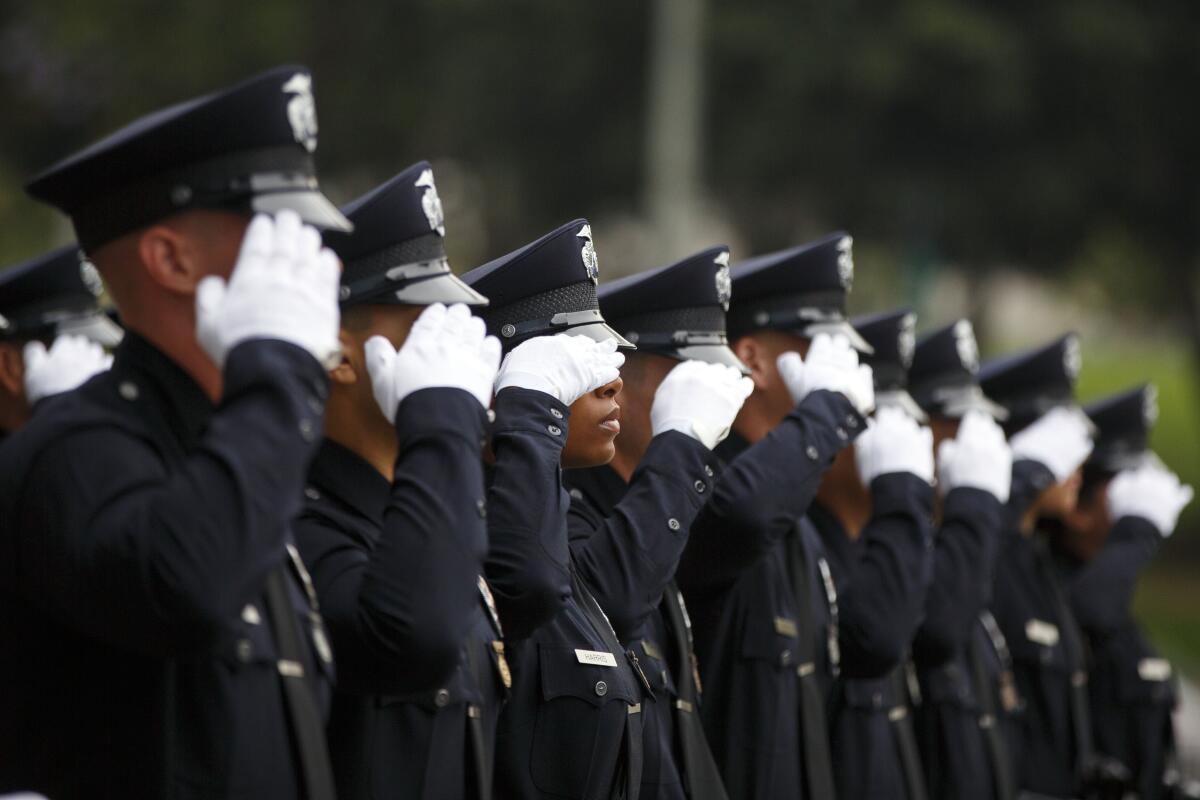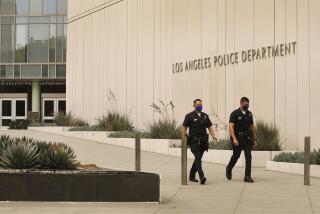Hundreds of ‘undercover’ LAPD officers take step to sue city over release of photos

More than 300 Los Angeles police officers who worked in sensitive assignments gave notice Tuesday that they will file a negligence lawsuit against the city for allegedly endangering their lives by releasing their department photographs along with images of thousands of other cops under the state’s public records law.
The government claim, a required precursor in California to a lawsuit against the city, seeks damages for the Los Angeles Police Department’s alleged “negligent, improper and malicious” release of their names, photographs and other identifying information.
Those images, along with photos of 9,000 other LAPD officers, were posted online by an activist group last month. The claim shields the officers’ names, citing the potential harm to them and their work.
“The City of Los Angeles’ reckless production of the undercover officers’ identities does irreparable damage to these individuals — their lives, careers and ongoing investigations are at risk,” said Matthew McNicholas, one of three lawyers representing the officers. “The City of Los Angeles and LAPD have a duty of care to their employees and should have had appropriate safeguards in place to ensure nothing like this ever happened. They need to face responsibility for their catastrophic negligence.”
McNicholas told reporters Tuesday morning he was aware of several undercover operations that have folded as a result of the photos’ release. He said he was told by some LAPD supervisors that several of their undercover officers had been threatened, but declined to provide further details.
The LAPD released the officers’ images and information as part of a public records request to a journalist with the nonprofit newsroom Knock LA. The Stop LAPD Spying Coalition, an activist group, then turned the photos into a public, searchable database called “Watch the Watchers,” which includes each officer’s name, ethnicity, rank, date of hire, division/bureau, badge number and photo.
After the site’s launch last month, department leaders revealed that they had inadvertently released photos of officers working undercover as part of a disclosure required under the California Public Records Act.
McNicholas and attorneys Greg Smith and Jacob Kalinski allege that the city “ultimately incorrectly included undercover active-duty police officers and officers with prior undercover assignments,” and the LAPD constitutional policing director authorized the release without Chief Michel Moore’s apparent knowledge.
That release of photos, lawyers for the officers say, not only threatened the lives of the officers, some of whom are in deep cover with assumed identities as part of task forces in other states, but also endangered their families. McNicholas said some officers have already moved their families to new locations for their safety.
McNicholas said some officers who signed on to the claims worried about retaliation from the department for joining a legal action against LAPD leadership. He said they would turn over an anonymous list detailing the assignments of all 321 officers.
He said he had fielded hundreds of Zoom calls from officers over the last few weeks, questioning whether the department would protect them in the face of threats to their safety. “Will the city provide a service or money to scrub from the internet when these things keep popping up?” he said. “And my answer to them is, I don’t know what the city is willing to do.”
Asked how they hope to scrub the affected officers’ photos and information from the internet, McNicholas said he was still working that out.
“In the age of 1s and 0s, that’s going to be extremely difficult,” he said at a news conference at a Beverly Hills hotel. But, “to do nothing is not an option.”
Moore said he was unaware of the release of the photos until a reporter told him last month. He also said he has taken steps to address the safety concerns of those whose photos were released.
“We erred in the sense that there’s photographs that are in there that should not have been in there,” Moore said in an interview late last month. “Now ... that ship has sailed.”
Moore’s office did not immediately respond to a request for comment.
Tuesday’s claim takes a broader definition of “undercover” than that considered by the public. McNicholas said it’s unclear how many officers actually work undercover, pointing out that some have been operating surreptitiously for years while others go undercover only intermittently.
The photos released included members of the Special Investigation Section of the Robbery-Homicide Division that tails and watches violent criminals suspected in murders, serial robberies and kidnappings.
The claim comes after the Los Angeles Police Protective League sued the city and Moore seeking a judge to order the department to “claw back” the photographs.
The union’s lawsuit asks a judge to require the city “to undertake any and all necessary legal and/or equitable action to prevent further disclosure of undercover officer photographs, including but not limited to securing the unlawfully disclosed photographs from the [California Public Records Act] recipient, and ensuring such photographs are never publicly disclosed in the future.”
Robert Rico, the league’s general counsel, said that suit would give officers who believe their positions put them in potential danger “the ability to have redress in court and address the court to have their photographs and names clawed back. That’s a legal term.”
Rico acknowledged that the photos had already spread far beyond the Watch the Watchers website into other corners of the internet. But, he said, the union wants the court to “fashion a remedy” to scrub those photos of undercover officers as they surface online. The union is asking for a preliminary injunction and immediate temporary restraining order to prevent what it described as further harm pending a final judgment in the case.
The union did not immediately respond to a request for comment.
Hamid Khan, a coordinator with the Stop the LAPD Spying Coalition, has called the union’s filing a clear “assault on people’s rights to access” information necessary to hold the LAPD accountable. The coalition wants to abolish traditional law enforcement but in the interim has pushed for what it calls radical transparency.
The union has already filed a formal complaint against Moore and Lizabeth Rhodes, director of the LAPD’s Office of Constitutional Policing. Moore has asked the inspector general to take over the investigation into the release of the data to avoid a conflict of interest.
Mayor Karen Bass in a tweet last week called the release “an unacceptable breach that put the lives of our officers and their families at risk” and said she expects a “full accounting” of how it happened.
Multiple LAPD sources not authorized to discuss the photo controversy said Rhodes, who oversaw the photo disclosure, should have ensured that any officer working in an undercover capacity was excluded.
At Tuesday’s meeting of the civilian Police Commission, several public speakers rallied behind the Watch the Watchers project, arguing that it brought much-needed transparency to a department that had long fought to keep its operations secret.
About an hour into the meeting, commission President William Briggs abruptly announced that the proceedings would move behind closed doors, citing disruptions from the crowd.
More to Read
Sign up for Essential California
The most important California stories and recommendations in your inbox every morning.
You may occasionally receive promotional content from the Los Angeles Times.











